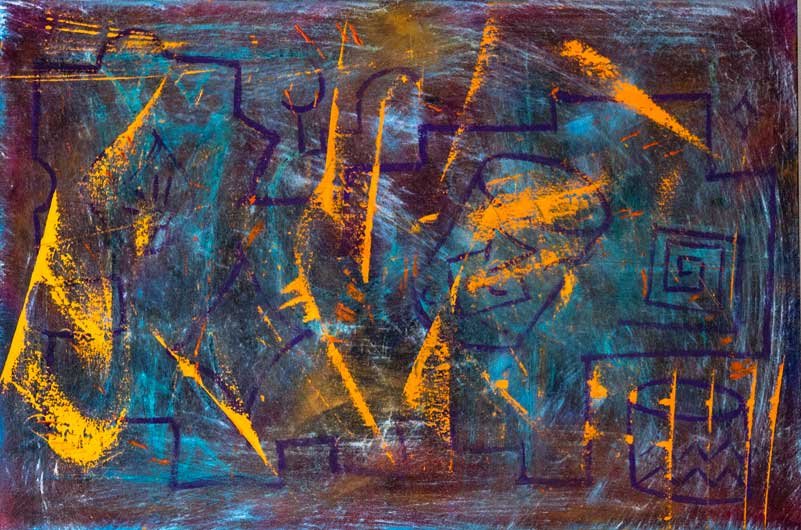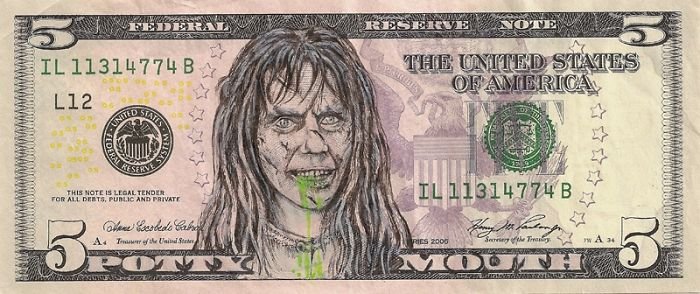
A violent shiver zapped Timmy away from sleep. The sudden coldness that flooded his room forced him to put a jacket over his meager Power Ranger pajamas. It was 2:26AM, mere minutes away from the inevitable arrival of his recent but relentless visitor. The clock kept ticking as Timmy sat motionless on the edge of his bed. He knew exactly what was about to happen, but that didn’t keep the tears from running wildly down his cheeks. 2:27AM. His hands painfully clenching his bed sheets. 2:28AM. His eyes forcefully closed as desperation crept into his tiny body. 2:29AM. The last few seconds of silence. 2:30AM. A single, almost inaudible knock on his door (...)
Footnote #1: The Unknown
It is only natural to equate horror with monsters, with bloodthirsty beasts and axe-wielding psychopaths. We may also find horror in our everyday quarrels, in that exorbitant mortgage or that term paper due tomorrow that you haven’t even begun to prepare. Our fear is free and diverse, and we humans have the uncanny talent of finding fright even in the most mundane of objects and situations. And yet, we are brave. We are brave in the sense that we usually stand up to these horrors and overcome them with sheer ingenuity and willpower. The monster can be slain, the beast can be hunt down, and the psychopath can be imprisoned. Your mortgage, while inconvenient, will succumb to the awe-inspiring power of financial responsibility, and that term paper is no match for a couple of hours of good old fashioned stress-writing. But, besides their horrific nature, what do monsters and mortgages have in common?

Well, the answer is quite simple: we know what they are. And in so far as we know what they are, we may also find a way to overcome them. Don’t get me wrong, we may fail, but at least we can try. Agency (to be understood as the ability to do something) is the most powerful weapon we can wield against fear.
Through and because of agency, we may channel our fear into more manageable feelings such as contempt or anger and, in the immortal words of Neil Gaiman:
Angry gets shit done.
By being able to act upon the object of our fear, fear itself gets diluted. It doesn’t disappear completely, but it most certainly gets watered down. There´s a path to follow, a solution to the problem. Ultimately, there’s hope.
This is especially true in fiction, because since we are not the ones being ravaged by fear, we can easily, and with complete detachment, rationalize the objects of fear within the story. For instance, while watching a horror movie about some dumb teenagers dwelling into a dark forest while there’s a murderer on the run, it is almost impossible for us not have a constant internal monolog about what we would’ve done differently. “I’d do this,” “I’d do that,” “I’d have never gone into that sketchy cabin,” and so on and so forth. However, the only reason we are able to carry out this process of rationalization is that we know exactly what we are up against.
With that in mind, I’d like you to consider the following image:

You may say that it’s only an empty black rectangle that couldn’t even scare a baby, and you’d probably be right. However, what if I could make you believe that what you are seeing is not emptiness, but darkness. What if I could make you believe that within that darkness dwells a horror so unspeakable that I couldn’t even begin to describe. What if the object of this horror would remain permanently unknown.
By making it impossible to relate fear to a concrete object, the possibility of agency is denied as well. There’s no path to follow, no solution to the problem. There is no hope. We can’t rationalize that which isn’t rational, and The Unknown is, by its very nature, irrational.
However, we humans really dislike irrational things. We dislike them so much that we’ve tried to rationalize everything, and we’ve been doing so throughout the entire history of our species. We made stories to explain why the sun came up every morning and why it rained and why it didn’t, we made stories about why we came into this world, and we keep making stories about what happens when we leave. The mere possibility of The Unknown is so viscerally intimidating to humans that we’d do anything to avoid it. Nonetheless, when faced directly with The Unknown, all hell breaks loose.
Imagine living alone in a small apartment. You go to your room, close the door, and get cozy in your bed. After a couple of minutes, and just before falling asleep, you start hearing constant knocking on the door. Your bedroom’s door.

During the seconds that follow, something very interesting will take place in your head. You have no idea of what is knocking on the door, but your very human nature will try to figure it out. And it will try hard. First, you’ll think it’s the neighbor’s cat who snuck into your house through an open window. Perhaps it’s a raccoon or even a pigeon. Then, you’ll be driven to less quaint scenarios. Perhaps it’s a thief or a murderer. Perhaps it’s that axe-wielding psycho you heard about in the news. Now, you’ll inevitably dwell into the fantastic. A ghost, hopefully a friendly one. But then a demon comes to mind, then faceless man, then a winged abomination. Perhaps it’s God, and it came to smite you for your sins.
This random list of potential outcomes arranged in chronological order is merely a way of attemping to illustrate what actually happens. In reality, you’ll consider all these possibilities and a thousand more within an instant. You won’t be able to make out any of them individually, so it all amounts to a single bedlam of indistinguishable horrors that ravages your body and crushes your soul. It may only last for a second, but during that second you are pretty much dead. Shortly after, your mind settles into a more comfortable scenario. Perhaps it is the axe-wielding psycho, and you’ve made your peace with that. But deep down, chaos still runs through your blood, a feeling of absolute helplessness that will not be quelled until you open the door or escape. That is the power of The Unknown. That is the dread we have been running from since time immemorial. This is what horror in fiction should strive to replicate.
Is The Unknown the only valid way of portraying horror? Of course not.
Is it even possible? I’d like to believe it is.
Should we at least try? Absolutely.
Footnote #2: The Maddening
Footnote #3: The Cosmic

I really hope you enjoyed this piece. Please follow me if you did! @jean.racines
Image sources (in order of appearance): Image 1, Image 2, Image 3, Image 4.
Further reading:
- Ahmad, A. (2010). Bordering On Fear: A Comparative Literary Study of Horror Fiction. Ottawa: Carleton University Press.
- Campbell, J. (1949). The hero with a thousand faces. Princeton: Princeton University Press.
- Lovecraft, H. P. (1973). Supernatural horror in literature. New York: Dover Publications.
- Mathiesen, T. (2004). Silently silenced: essays on the creation of acquiescence in modern society. Winchester: Waterside Press.
